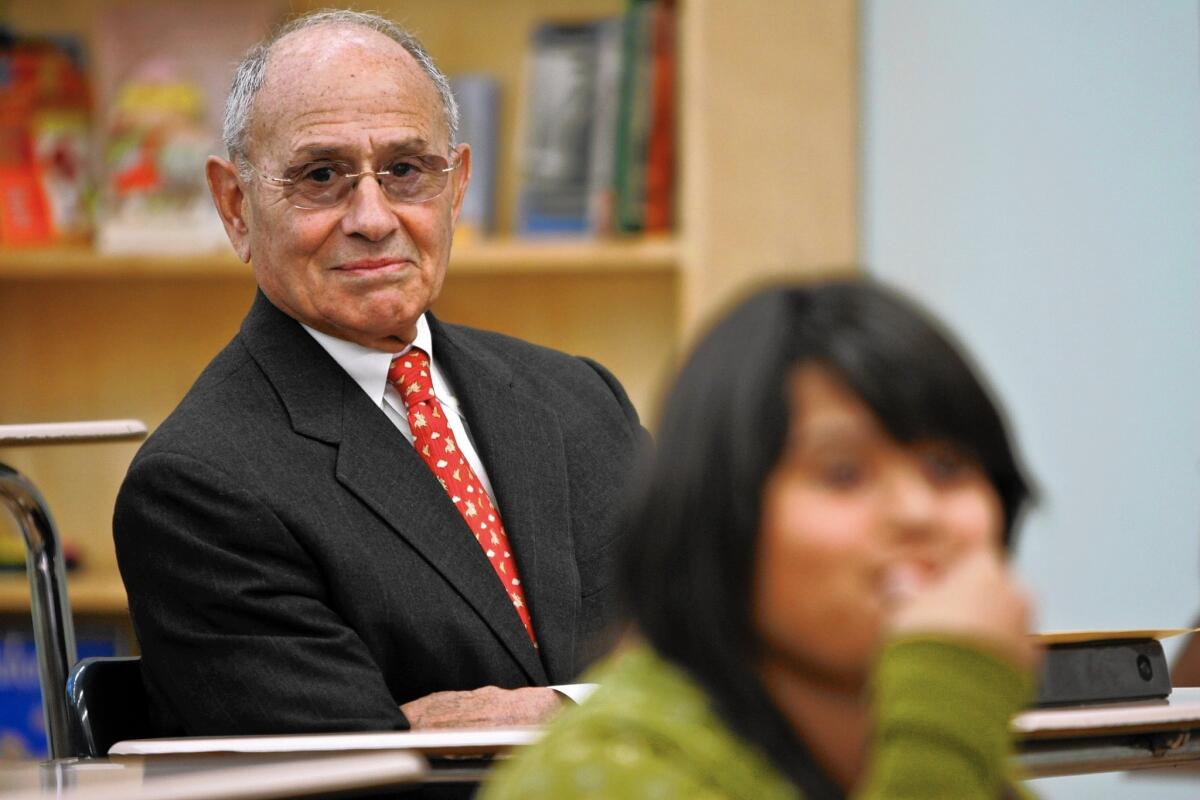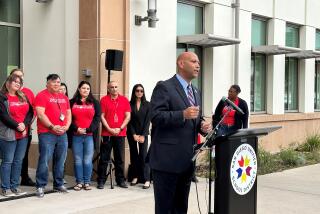L.A. Unified sees a familiar face in Ramon Cortines

In 1999, the L.A. school system was in disarray amid internal political conflicts and a disastrous high school building project.
School board members turned to Ramon C. Cortines to take control.
On Thursday, they once again turned to Cortines to lead the nation’s second-largest school system — this time to pick up the pieces after the departure of embattled Supt. John Deasy.
Cortines, 82, will return from retirement next week to serve as interim superintendent, his third tour of duty leading L.A. Unified.
“Given the current state of disarray in LAUSD, he was the only choice,” said A.J. Duffy, a former United Teachers Los Angeles president and 31-year district teacher before retiring last year. “Cortines is … probably the only one in the city with the ability and background to take up the post where everyone will support him.”
But Cortines’ selection also came with questions about how long would be practical for him to remain in charge. Cortines said he has not discussed with board members how long he will stay. Deasy’s supporters also question whether Cortines will push as hard for needed change.
Cortines takes control of a district divided over Deasy’s management style as well as problems with some of his signature projects, most notably the effort to provide iPads to all students and teachers. In recent weeks, the district has also been mired in debate about a malfunctioning computer system that has prevented thousands of students from getting the classes they need to graduate.
In an interview, Cortines said he did not expect the appointment and had no easy answers for the district’s problems. But he said a key goal will be to rebuild a sense of teamwork among all staff.
“A superintendent doesn’t bring any solutions. A team does,” Cortines said. “And it has to be teachers, administrators, cafeteria workers and custodians, the maintenance and operation workers” and board members.
He said he plans to promote Deputy Supt. Michelle King to the position of chief deputy and give her more independence and responsibility. Earlier, King had expressed to the board her interest in serving as interim superintendent if Deasy were to leave. She didn’t get the job, but is expected to remain under Cortines, who had promoted her to a senior post during his previous stint.
He gave no clear outlook for key Deasy initiatives, saying he would review them
Speaking on the troubled iPad program, Cortines said the district should seek student input on their technology needs and take more time deciding on the best tools for them.
“Some of these issues cannot be solved overnight,” he said.
A major challenge will be improving relations with board members, whose fractious relationships helped end Deasy’s tenure. But Cortines is a master at building such ties, according to Genethia Hudley Hayes, a former school board member who first brought Cortines to L.A. Unified in 2000 to serve as interim superintendent after Ruben Zacarias was ousted.
She said he would spend a full hour with each board member every week to hear their concerns and use the information to forge such policies as dividing the massive district into regional offices.
“The best gift Ray has is in fact navigating waters in troubled times,” Hudley Hayes said. “I can think of no one else who would be a better choice. Why he would want this, God only knows.”
Both Cortines’ supporters and critics have described him as stubborn and self-confident, whose years of experience have made him nimble at managing the pressure of running such a large institution.
The veteran educator brings with him a resume much longer than service in L.A. Unified. A Texas native, he also headed the New York City school system and led the school districts in Pasadena, San Jose and San Francisco.
After his first stint as interim schools chief, he agreed to return in 2008 as deputy superintendent. At the time, he was chief education advisor and deputy mayor to then-Los Angeles Mayor Antonio Villaraigosa. At the district, he first ran day-to-day operations under then-Supt. David Brewer, but eventually moved to the top job.
In his second stint as superintendent, Cortines grappled with the worst budget crisis in decades — caused by declining enrollment and the economic recession, a situation that also plagued Deasy.
Cortines also faced constant political pressure from a mayor bent on asserting power over the district, and a variety of other outside forces.
Cortines worked to shrink what he saw as a bloated central bureaucracy — achieved partly through layoffs — and fought to transfer more control over spending to schools.
In controversial moves, he allowed more charter schools to move onto traditional school campuses, replaced some school administrators who failed to improve quickly enough and clashed with the teachers union by forcing staffs at several underperforming campuses to reapply for their jobs.
Still, during his last stint as superintendent Cortines began to fall from favor among some philanthropists, foundations and activists who wanted to see aggressive, fundamental change in L.A. Unified. They felt Cortines wasn’t moving quickly enough and that he was too much of a traditional educator.
There also was another issue that would dog him. A mid-level administrator, Scot Graham, accused Cortines of sexual harassment.
In 2012, a year after Cortines retired, the district announced a $200,000 settlement with Graham. The deal later unraveled and Graham sued Cortines and the district. One suit was dismissed on technical grounds and a second suit was withdrawn, according to L.A. Unified. Graham remains a district employee. The district estimates it spent $250,000 in legal fees and other costs related to the matter.
Elise Buik, president of United Way of Greater Los Angeles, said Cortines is exactly what LAUSD needs now.
“He is unifying and tells it like it is when he needs to,” she said. “He spent a lot of time building relationships with board members and trying to figure out how to create more common ground and build trust. Maybe he’ll show and remind us how to do it and how to chart a new way forward.”
Though Cortines has not yet unveiled an overall vision, he has decided on his first act in office: a 7:30 a.m. meeting Monday with the district’s leadership staff.
More to Read
Sign up for Essential California
The most important California stories and recommendations in your inbox every morning.
You may occasionally receive promotional content from the Los Angeles Times.













